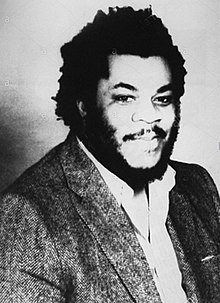 Orville Blackwood | |
| Date | 28 August 1991[1] |
|---|---|
| Venue | Broadmoor Hospital[1] |
| Location | Berkshire |
| Cause | Overdose with promazine and fluphenazine[1] |
| Inquiries | Report of the committee of inquiry into the death in Broadmoor Hospital of Orville Blackwood, and a review of the deaths of two other Afro-Caribbean patients: "big, black and dangerous?"[1] |
| Verdict | “Accidental death”[1] |
Orville Blackwood (June 1960 – 28 August 1991) was a Jamaican-born British man, whose death at Broadmoor Hospital on 28 August 1991, following the administration of large doses of antipsychotic medications, resulted in wide media coverage after an inquiry into the circumstances surrounding his death. The inquiry published a report in 1993 titled 'Report of the committee of inquiry into the death in Broadmoor Hospital of Orville Blackwood, and a review of the deaths of two other Afro-Caribbean patients: "big, black and dangerous?".[2]
Blackwood moved to England with his mother when he was a child. In his 20s, he found it hard to hold down employment, became involved in petty crime and served brief prison sentences. He became known to mental health services in January 1982, following which a series of brief admissions became the pattern over subsequent years, with states of highs and agitation, sexual disinhibition and aggression. In January 1986, using a toy gun, he attempted to rob a betting shop, for which he received a three-year sentence and was sent to HM Prison Grendon, before being transferred to Broadmoor, a combination of a high security prison and a psychiatric hospital. There, several times he was restrained, placed in seclusion and administered large doses of medications in response to his behaviour.
In September 1991, an independent inquiry, chaired by Herschel Prins, was set up by the Special Hospitals Service Authority. It also looked at two other deaths at the same hospital. The report was highly critical of the care received by Blackwood and it made 47 recommendations. The report identified how hospital admissions of black people were more likely to have police involvement, and include detainment and secure care. They were more likely to be diagnosed with schizophrenia and to be given higher doses of medication, and were less likely to receive psychotherapy.